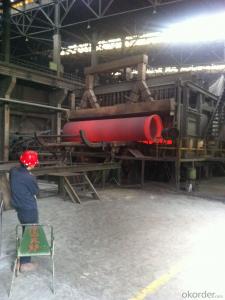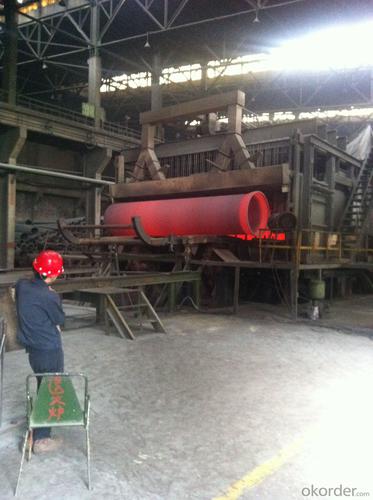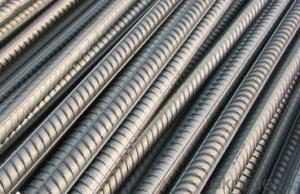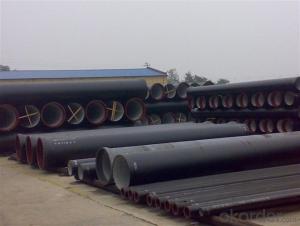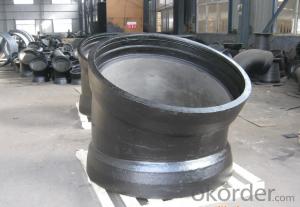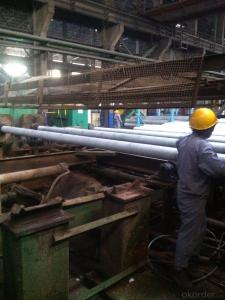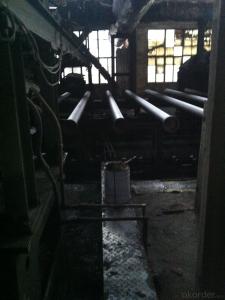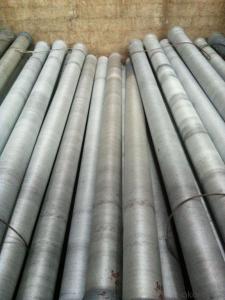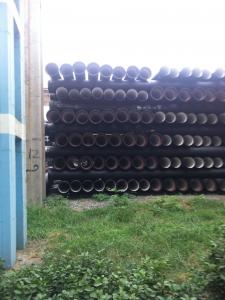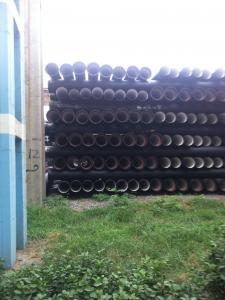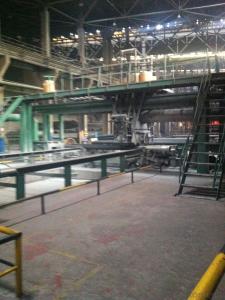DUCTILE IRON PIPES AND PIPE FITTINGS K9 CLASS DN900
- Loading Port:
- Tianjin
- Payment Terms:
- TT OR LC
- Min Order Qty:
- 22 pc
- Supply Capability:
- 3000 pc/month
OKorder Service Pledge
OKorder Financial Service
You Might Also Like
Material : Ductile Cast Iron
Size Range : DN 80mm to DN 2000mm
Unit Effective Length : 6m or 5.7m
Manufacture Standard: ISO 2531:1998/ EN 545:2006/EN 598:2007
Annual capacity : 200,000 tons
Coating Exterior: Zinc 130g/m2 according to ISO 8179-1 and bitumen coating 70 microns.
Cement Interior: Portland Cement/ High Alumina Cement/ Sulphate Resisting Cement Lining according to ISO 4179
Special requirements on external coating and internal lining can be applied
We also provide accessories such as SBR/EPDM rubber gaskets, lubricant paste, pipe caps, PE sleeves, etc.
Additional Parts:
Each pipe is strictly inspected according to related standard to ensure permanently high performance.
Easy Installation at site and service free for life
Long Service Lifespan
Quotation will arrive you within 24hours once we get your inquiry.
We guarantee offering you a competitive price.
A copy of original inspection reports of pipes will be offered after shipment.
Photos of loading process will be sent to the customer after shipment effect.
We will follow-up the delivery progress after shipment effect and update to the customer on weekly basis.
- Q: Can ductile iron pipes be used for agricultural applications?
- Yes, ductile iron pipes can be used for agricultural applications. Ductile iron is a strong and durable material that is resistant to corrosion, making it suitable for various agricultural purposes. These pipes can be used for irrigation systems, drainage systems, water supply systems, and other agricultural infrastructure projects. Ductile iron pipes have a high tensile strength and can withstand the external pressures and stress that may occur in agricultural environments. Additionally, they have a long lifespan, reducing the need for frequent replacements, and are capable of handling high water flow rates. Therefore, ductile iron pipes are a reliable choice for agricultural applications.
- Q: Can ductile iron pipes be used in areas with high levels of hydrogen sulfide gas?
- Ductile iron pipes can generally be used in areas with high levels of hydrogen sulfide gas, but it is important to consider certain factors before making a decision. Hydrogen sulfide gas is corrosive and can potentially cause damage to metal pipes over time. While ductile iron is known for its durability and corrosion resistance, prolonged exposure to high levels of hydrogen sulfide gas can still lead to corrosion and deterioration. To mitigate the risks associated with hydrogen sulfide gas, it is advisable to assess the specific conditions of the area beforehand. This includes conducting a comprehensive analysis of the hydrogen sulfide gas concentration, pH levels, temperature, and other factors that may influence corrosion. Consulting with experts or engineering professionals who specialize in corrosion control can provide valuable insights and guidance. In some cases, additional measures may be necessary to protect ductile iron pipes. Coating the interior and exterior surfaces of the pipes with protective materials, such as epoxy or polyethylene, can provide an extra layer of defense against corrosion. Alternatively, cathodic protection systems can be employed to protect the pipes by applying a low voltage electrical current that mitigates the corrosion process. Ultimately, the decision to use ductile iron pipes in areas with high levels of hydrogen sulfide gas should be based on a thorough understanding of the specific conditions and implementing appropriate corrosion prevention measures. Regular monitoring and maintenance should also be conducted to ensure the pipes are functioning optimally and to address any potential issues before they escalate.
- Q: What's the advantage of FCD50 ductile iron?
- The threading pipe threading pipe application of flame retardant PVC line pipe, the pipe wall surface should be smooth, the wall thickness required was not broken finger pinch strength, but also should have the certificate. You can also use the national standard galvanized pipe as threading pipe.
- Q: How do ductile iron pipes handle thermal cycling in industrial applications?
- Ductile iron pipes are known for their exceptional ability to handle thermal cycling in industrial applications. Thermal cycling refers to the fluctuation in temperature that occurs during the operation of various industrial processes. These pipes are designed to withstand the stresses caused by thermal expansion and contraction, making them highly suitable for environments with significant temperature variations. One of the key characteristics of ductile iron pipes is their high thermal conductivity. This means that they can efficiently conduct heat away from the hot areas, minimizing the impact of thermal cycling. Additionally, ductile iron pipes have a low coefficient of thermal expansion, which means that they expand and contract at a slower rate compared to other materials. This helps to reduce the stresses imposed on the pipes during thermal cycling. Furthermore, ductile iron pipes have excellent mechanical properties, including high tensile strength and impact resistance. These properties enable the pipes to withstand the mechanical stresses that may arise due to thermal cycling. They can resist the formation of cracks or fractures, ensuring the integrity and longevity of the pipes in industrial applications. Moreover, ductile iron pipes have a high resistance to corrosion and oxidation. This is particularly important in industrial settings where the pipes may be exposed to aggressive chemicals or harsh environments. The corrosion resistance of ductile iron pipes ensures that they can withstand the corrosive effects of the process fluids and gases, even during thermal cycling. In summary, ductile iron pipes are well-equipped to handle thermal cycling in industrial applications. Their high thermal conductivity, low coefficient of thermal expansion, excellent mechanical properties, and resistance to corrosion make them a reliable choice for environments with significant temperature variations. These pipes can effectively withstand the stresses caused by thermal cycling, ensuring their durability and longevity in industrial settings.
- Q: How do ductile iron pipes handle ground movement in earthquake-prone areas?
- Ductile iron pipes are known for their excellent resistance to ground movement, making them a reliable choice for earthquake-prone areas. These pipes are designed to withstand external forces, including the ground shifting and movement caused by seismic activities. The flexibility of ductile iron pipes allows them to absorb and distribute the energy generated during ground movement. This flexibility is achieved due to the unique composition of ductile iron, which includes nodular graphite in its microstructure. The nodular graphite provides ductility and resilience to the pipe, allowing it to deform under stress without fracturing. When an earthquake occurs and the ground starts to move, ductile iron pipes can adapt to the changing conditions. They have the ability to elongate, compress, and bend, thus reducing the risk of pipe failure. This characteristic is crucial in earthquake-prone areas, as it helps prevent catastrophic failures and water loss that can occur with more rigid pipe materials. Moreover, ductile iron pipes have a high level of joint integrity, which further enhances their ability to handle ground movement during seismic events. The joints of these pipes are designed to withstand lateral and angular movement, ensuring that they remain intact and leak-free. In addition to their inherent flexibility, ductile iron pipes are often installed using techniques that enhance their resistance to ground movement. Anchoring systems, such as thrust blocks and restraints, can be utilized to secure the pipes and prevent excessive movement. These systems help to stabilize the pipeline network and further minimize the potential for damage during earthquakes. Overall, the combination of ductility, joint integrity, and anchoring systems make ductile iron pipes a reliable choice for handling ground movement in earthquake-prone areas. They provide a durable and resilient solution that can withstand the challenges posed by seismic activities, ensuring the continuous supply of water and minimizing the risk of infrastructure damage.
- Q: Can ductile iron pipes be used for stormwater drainage?
- Indeed, stormwater drainage systems can utilize ductile iron pipes. Renowned for their robustness and endurance, ductile iron pipes are apt for numerous purposes, including stormwater drainage. Notably, these pipes possess remarkable tensile strength, enabling them to endure substantial loads and pressure, rendering them optimal for transporting significant volumes of stormwater. Furthermore, the smooth interior surface of ductile iron pipes diminishes friction and encourages efficient water flow, reducing the likelihood of obstructions and congestion. Through meticulous installation and upkeep, ductile iron pipes can furnish a dependable and enduring resolution for stormwater drainage.
- Q: Can ductile iron pipes be used in areas with high soil liquefaction potential?
- When dealing with areas prone to high soil liquefaction, it is important to take certain precautions and considerations into account when using ductile iron pipes. Ductile iron pipes are known for their strength, durability, and resistance to external loads, making them suitable for various applications, including water and wastewater transportation. One essential aspect to consider is the depth at which the pipes are installed. It is advisable to install ductile iron pipes at a sufficient depth below the ground surface to minimize the effects of soil liquefaction. The appropriate installation depth will depend on factors such as soil conditions and the level of seismic activity in the area. To determine the correct depth, it is essential to consult geotechnical engineers and adhere to local building codes and regulations. In addition, it is crucial to use proper backfill materials and compaction techniques during the installation process. Utilizing granular materials like crushed stone or gravel for backfill can enhance the stability of the soil and reduce the risk of liquefaction. It is also important to ensure adequate compaction of the backfill to maintain the stability of the pipes and prevent settlement or movement during seismic events. Furthermore, when installing ductile iron pipes in areas prone to soil liquefaction, it is recommended to use flexible joints, such as restrained joints or push-on joints. These types of joints allow for some movement and flexibility, which can help absorb the ground's movement during an earthquake. This, in turn, reduces stress on the pipes and minimizes the likelihood of damage. Regular inspection and maintenance of the ductile iron pipes play a critical role in high soil liquefaction potential areas. It is essential to monitor for any signs of movement, settling, or damage and address any necessary repairs or reinforcements promptly. This ensures the continued performance and safety of the pipes. In conclusion, although ductile iron pipes can be used in areas with high soil liquefaction potential, it is necessary to take several measures into consideration. These include determining the appropriate installation depth, using proper backfill materials and compaction techniques, employing flexible joints, and conducting regular inspection and maintenance. Consulting with geotechnical engineers and adhering to local building codes and regulations is strongly recommended to ensure the suitability of the pipes in such areas.
- Q: Can ductile iron pipes be used for water supply networks?
- Indeed, water supply networks can utilize ductile iron pipes. Renowned for their robustness and endurance, ductile iron pipes are adept at transporting water across extensive distances. Their resistance to corrosion, ability to withstand high pressure and external forces, render them a dependable option for water supply systems. Furthermore, the smooth internal surface of ductile iron pipes diminishes friction and facilitates efficient water flow. Consequently, due to their exceptional performance and longevity, ductile iron pipes have gained global popularity in water supply networks.
- Q: Can ductile iron pipes be used for trenchless installations?
- Yes, ductile iron pipes can be used for trenchless installations. Trenchless methods such as horizontal directional drilling (HDD) and pipe bursting have become popular alternatives to traditional open-cut trenching for installing underground utilities. Ductile iron pipes are suitable for trenchless installations due to their strength, durability, and flexibility. They can withstand the forces involved in HDD and pipe bursting processes without compromising their structural integrity. Additionally, ductile iron pipes have excellent resistance to corrosion, making them a reliable choice for trenchless applications.
- Q: What are the different types of linings available for ductile iron pipe?
- There are several different types of linings available for ductile iron pipe, each with its own advantages and applications. 1. Cement mortar lining: This is one of the most common linings used for ductile iron pipes. It consists of a layer of cement mortar applied to the interior surface of the pipe. Cement mortar lining provides excellent resistance to corrosion and chemical attack, making it suitable for a wide range of applications, including potable water distribution, wastewater conveyance, and industrial pipelines. It also helps to reduce friction and turbulence within the pipe, improving flow efficiency. 2. Polyethylene lining: Polyethylene linings are often used in ductile iron pipes for applications where corrosion resistance is a primary concern. This lining consists of a layer of high-density polyethylene (HDPE) that is either extruded or sprayed onto the pipe's inner surface. Polyethylene lining provides superior resistance to corrosion, abrasion, and chemical attack, making it ideal for transporting aggressive fluids, such as saltwater, chemicals, or industrial waste. 3. Polyurethane lining: Polyurethane linings are commonly used in ductile iron pipes for applications where enhanced protection against abrasive wear is required. This lining is formed by spraying or pouring a layer of polyurethane onto the inner surface of the pipe. Polyurethane lining offers excellent resistance to abrasion, impact, and chemical attack, making it suitable for conveying abrasive slurries, mining applications, and other high-wear environments. 4. Epoxy lining: Epoxy linings are applied to ductile iron pipes to provide a protective barrier against corrosion and chemical attack. This lining is typically formed by applying a layer of epoxy resin to the pipe's inner surface through a process known as centrifugal casting or electrostatic spraying. Epoxy lining offers excellent adhesion and resistance to corrosion, making it suitable for various applications, including potable water distribution, wastewater treatment, and industrial pipelines. 5. Zinc lining: Zinc linings are used in ductile iron pipes to provide cathodic protection against corrosion. This lining involves applying a layer of zinc to the pipe's inner surface, either through hot-dip galvanizing or by electroplating. Zinc lining acts as a sacrificial anode, corroding preferentially to the iron pipe and protecting it from corrosion. It is commonly used in applications where the pipe is exposed to highly corrosive environments, such as seawater or acidic soils. Overall, the choice of lining for ductile iron pipes depends on the specific requirements of the application, including the type of fluid being transported, the level of corrosion resistance needed, and the potential for abrasive wear. Consulting with industry experts and considering factors such as cost, longevity, and maintenance requirements can help determine the most suitable lining option for a particular project.
Send your message to us
DUCTILE IRON PIPES AND PIPE FITTINGS K9 CLASS DN900
- Loading Port:
- Tianjin
- Payment Terms:
- TT OR LC
- Min Order Qty:
- 22 pc
- Supply Capability:
- 3000 pc/month
OKorder Service Pledge
OKorder Financial Service
Similar products
Hot products
Hot Searches
Related keywords
